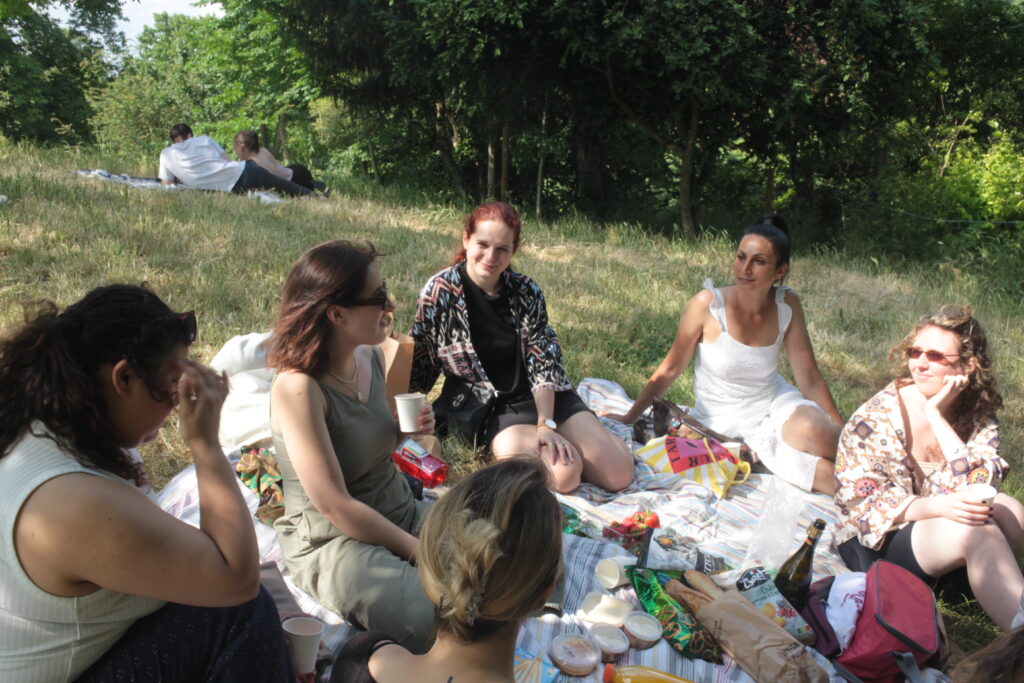How Lazy Women overcomes gender stereotypes and builds a new kind of feminist community in Europe
This interview was originally published in Hungarian in Népszava, written by Orsolya Bálint.
The activists of the Lazy Women international platform break taboos and stereotypes even with their name, because a woman is in fact never lazy. When she is not working hard in her formal job, she does invisible work in the household, for the family and in the community – often, it’s both. If we converted this to revenue worth, Hungary’s GDP would be at least 25 per cent higher. Still, most of us get reprimanded throughout our lives for “not doing your job” or are told “you’re just messing around with press materials” (think: Bridget Jones’s Diary), while a man “works hard”.
Capitalism also takes advantage of our internalised work compulsion, often chasing women who are considered cheap, second-class labour to the point of burnout. According to Zsofi Borsi, one of the founders of the Lazy Women platform, our endless workload and the multitasking myth that we are socialised into performing only normalizes self-sacrifice. Together with their peers, the Lazy Women team questions the dishonourable meaning of laziness and builds a community around doing so. An increasing number of people are joining them worldwide, not only young people who already see the pitfalls of traditional roles, but their message also resonates with women of all ages, across the generations. They have a decent number of male readers as well.
Three years ago, at the beginning of the pandemic, Zsofi Borsi and her friends decided to start a blog to offer readers positive energy during these dark and worrying times.
Around this time, a lot of articles were published about how to take advantage of this period as a woman. Embrace your creativity, exercise more, and be even prettier by the end of the quarantine! “We wanted to see something different,” says Zsofi, who now manages Lazy Women from Paris, while editing the publications of a start-up part-time. She involved her fellow Central European University students in the project initially and having previously studied in England, her friends there also got involved.
Zsofi explains, “At first, even with just a few people on board, we published 3-4 articles a week – which was a lot! We made photo collages as illustrations, then more people came forward to draw, and wider collaborations started. In the beginning, everything came to me for consideration, editing and publishing, but to share the workload I had two Hungarian co-founders who came on board. They later receded into the background, but still support me and our mission. We have now formalised the structure with a core executive team: Dorina Nagy, who lives in Vienna, is responsible for the newsletter and for managing our 33 registered members and roughly 50 related volunteers; Czech-born Lucie Hunter, who lives in Italy, produces our podcast in addition to helping out with our newsletter, and I edit the written content.”

Lazy Women executive team: Lucie, Dorina and Zsofi. Photo by Mabel McCabe..
Lazy Women brings us together
Their goal is to create a community of women who are perhaps missing something from their everyday lives, or who are alone with their feminist or non-traditional views in their family, city, or village – but in the virtual space, they can express their thoughts, especially those which in some communities are considered taboo. Whether the topic is motherhood or the division of labour, everything is examined from a system-critical perspective.
They are connected by “lazy womenness”, an edgy identity that includes contradictions and complexities – which society isn’t always kind enough to allow women to express.
“Many people are connected to the name of our platform, for different reasons. It is a life goal for someone to get there, to be able to feel rested, not to feel that they are overwhelmed every day because they have to meet so many expectations. Others come to us having already overcome burnout. It’s shocking to see how many young women are already feeling this way at university and in their first professional jobs. Because of this, they feel that they now have to become “lazy women”, embracing slowing down, not because they wanted to, but because they were forced to do so. At our last meet-up in Paris, there were 35 of us, at least ten of us said that they were looking for content related to burnout, which had led them to Lazy Women,” says Zsofi.
The reality for many women is that they never rest, they are absolutely not lazy, and if the pressure that perpetuates this does not come from the outside, they are driven by the internalized compulsion to keep themselves busy. The content of the Lazy Women platform also points out that the younger generation, millennials, Gen Z, and those coming up beyond, should be more aware of the explicit and implicit social, employer, and relationship expectations.
“We don’t preach, we don’t claim that everything in our lives is perfect and that all work at home is equally divided. We are trying to build collective awareness so that self-sacrifice and putting others first are no longer the norm. We say that you can put yourself first, which of course is not always easy. We write a lot about relationships, but we also aim to not always try to see ourselves and our roles only through the lens of romantic relationships. Though our members, writers and readers come from all over the world, through individual stories we find common patterns, allowing us to resonate with each other in meaningful ways. By sharing these, we understand more about how it is not only our personal responsibility to deal with certain challenges or issues to solve alone, but actually, we are in this together; we are part of a larger, structural problem,” Zsofi explains.
“We are also concerned with body image and mental health and weave systemic critique into personal perspectives on such topics”.
“Anyone can write for us, if the pitch feels right for our mission, and our goal is for authors whose profession is not journalism to appear in the media. This is really important to us; the mainstream media has a strong culture of objectivity, and the personal point of view disappears, which is why we place it at the centre of an ideal Lazy Women article,” explains the founder. The articles are usually inspired by personal experience, and then the author looks behind them, why this is so, and perhaps adds data and research, but the emphasis is not on these. Their motto, “the personal is political,” adopted from Western women’s movements in the 1960s, combines these two approaches to help structure their approach.

Lazy Women at Budapest Pride, 2023. Photo by Kinga Gárdonyi.
Make like a man?
“We talk a lot about what feminism means to whom, of course, it’s different for everyone, but in my age group, I see that attitudes have changed. In my mother’s generation, it meant behaving like a man to be equal: you can be a “girl boss” who works full-time, plays sports alongside an interesting career, meets the patriarchal ideal, has a husband and three children – but of course, this means overextending oneself in all areas of life.
Many of us don’t like the “lean in” feminism that Sheryl Sandberg, Meta’s CEO, introduced to the public through her 2013 book.
She encouraged women to throw themselves into the expectations of the corporate hierarchy to progress as a woman, potentially even walking over other women in the process, since there are few leadership positions for us. We reflect on this approach a lot, with the aim to counter it by exploring what a good life can mean – one in which you don’t have to take everything on yourself, take pleasure in how you earn a living, and still have time for rest. This is difficult, of course, because the social framework dictates that it’s not really meant to be this way. But we also aren’t saying that if this is the path a woman chooses, to lean into masculine energy to reach a level of success, that it is inherently wrong – it’s just that we know this can often lead to burnout, so we’d encourage her to think about an alternative way,” Zsofi points out.
Katalin Novák rightly comes to mind, who “proved” that there is equality between the sexes in Hungary since a woman can be the Hungarian President of the Republic and one who welcomes the head of the Catholic Church with home-baked goods. But as Zsofi reflects, “the majority of women, on the other hand, feel that it doesn’t work for them, or only at the cost of being completely exhausted and not having a minute to themselves. That is why today’s generation of 30-somethings, who are now preparing to take on these roles, fail to understand how to avoid the pitfalls. Questions around marriage and children are other key elements that we explore – topics that resonate with many women, in Hungary and beyond.”
“All women are lazy”
“If the Hungarian social system were not overwhelmingly patriarchal, the political discourse would better explore the role of women today,” Zsofi argues. Every woman experiences a myriad of double standards and even Zsofi shares how her ex-boyfriend, a Hungarian guy, once told her that “all women are lazy”, while men work hard. This is where the Lazy Women mentality started, her realisation that she should embrace this because it is such an absurd statement, and moreover, she saw the exact opposite around her.
However, no movement fighting for equality has yet been able to achieve results by fighting alone. Men are also affected by these traditional norms; they are also under a lot of pressure to become successful in a respected career, then get married and start a family – yet they do not organize themselves into communities in the same way. Or if they do, the so-called men’s rights organisations go in the opposite direction, for example, they want to regain the lost privileges. “In America and Western Europe, “healthy masculinity” movements have started, but these again only focus on what is feminine and what is masculine, setting up binary categories, putting even more labels on things, instead of allowing more of what a woman or a man can be like. People of any gender and identity can join us if they can write from a perspective related to a woman’s lived experience. First, we need to build strength in women, and for this, we need to create a safe space, which we believe is best done in a women-centric environment. 30% of our readers are already men, and they want to see what women think about and discuss when we’re together,” Zsofi highlights, “and to support our endeavours.”
As many of the core millennial members and contributors to the platform approach the next milestone in life, whether it be marriage or motherhood, an increasing amount of articles are exploring these themes, particularly the relationship between motherhood and productivity, or how the birth of a child affects creativity. True to the Lazy Women mission, these perspectives are being told through the eyes of those experiencing them, not in an idealised or purely factual way as might be found in typical mainstream media. Authors write about ageing, and how this generates new pressure for women in the middle generation – while men may be starting a second family just then without a second glance from society.
Lazy Women also actively counteracts the culture of productivity, with many people finding their creative selves by contributing to the platform alongside work, and then it becomes their own project.
While managed by a core team, this really is an inclusive and communal venture. Contributors are often writing for the first time in English, or gaining a new opportunity to produce a podcast. While many have studied political or social sciences, Zsofi included, here they find their creative side, though still find ways to bring in their academic experience such as through the creation of a Hungarian feminist pocket dictionary. This was a project that saw Hungarian lazies, as the Lazy Women community members are affectionately referred to, attempt the translation of English terms such as mansplaining (when men explain something to women that they themselves have already explained or are typically more knowledgeable about). Hungarian and other Eastern European members joined in with the project because they feel that the terminology always comes only from the West, even though if these are not integrated into other languages, then the required social change will not happen. Moreover, it is easy to point out that this is just “Western political correctness madness, woke terror and gender propaganda”, but Zsofi and co. want to give more legitimacy to movements in non-western countries and communities.
“I find it strange that in Hungary, many say that gender is pushed too far. Where though? It is no longer possible to study gender at university, hold classes about it in schools, hear about it on TV, or read about it in children’s books. Because of this, half of the literature is censored. Already through my own studies, I observed how images of “the enemy” change in Hungarian society, and gender has become the latest villain of choice for those who wish to see traditional norms preserved. I’ve read a lot about how when a kind of hatred is created, it affects all the other groups that are not in the crossfire because people learn the closed, exclusionary core values. The openness and acceptance of Hungarian society has been undermined for so long that it will only be possible to rebuild it very slowly,” Zsofi says sadly.

Lazy Women meet-up in Paris, 2023. Photo by Mabel McCabe.
A real feminist workplace
At first, Lazy Women developed organically, but half a year ago, they were included in the accelerator program of the International Press Institute, where they participated in intensive training together with several smaller Eastern European media.
“Since then, we have been organizing in a more targeted manner, and we are planning a crowdfunding campaign for October, because without financial support it is no longer possible to carry out such a large project, or we will become a contradiction if we, as Lazy Women, burn ourselves out.”
The majority do this work around full-time paid jobs, often at night, because they believe in the goal, but we think there is enough value in it that we can and should be remunerating contributors – because what we are doing here is indeed work. That’s why we write at the end of each article and the newsletter how many working hours it took. On the other hand, we still have a lot of ideas, we want to build a Lazy Women club, a bigger virtual community. We would organise events, creating even more safe spaces in the online and offline world, where we (and you, reader!) can get to know each other, talk, come up with ideas, and create together. Our long-term goal is to have Lazy Women ambassadors in the larger cities who bring the community together locally.”
This article was translated by Lazy Lauren.

